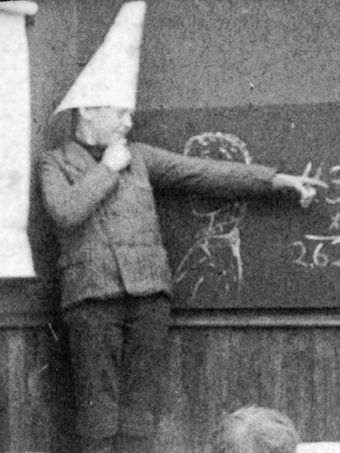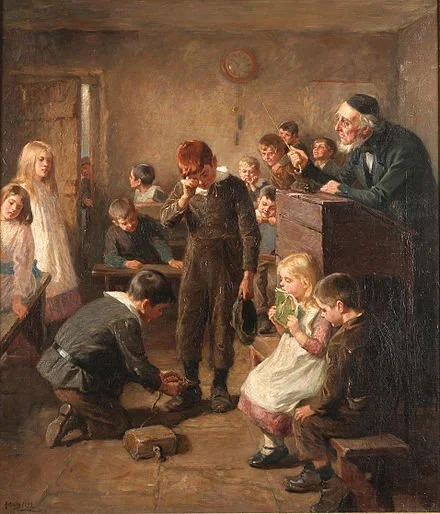
Chris Powell: Only obnoxious students justify teacher raises now; justice system runs on sometimes dubious plea bargains
Young student wearing dunce hat as punishment in 1906 photo
Latch-key kid of parents who aren’t home
MANCHESTER, Conn.
Student performance continues to crash in schools in Connecticut and throughout the country. The results of the latest National Assessment of Educational Progress tests showed steep declines in the reading and math proficiency of 13-year-olds. Students are doing worse than a decade ago.
But as usual there is much clamor to increase compensation for teachers, to hire more teaching assistants, and to keep increasing spending on schools even as enrollment keeps falling.
The enduring gap between school spending and student performance should have destroyed by now Connecticut's longstanding presumption that spending equals education. But the presumption is sustained by the influence of the presumption's main beneficiaries -- members of teacher unions -- and by the public's not wanting to acknowledge education's decline. For doing so might lead to other troubling realizations.
One such troubling realization would be that teacher pay has to keep being raised not because teachers are successful but because students are making their jobs insufferable.
Teachers are leaving the profession and recruiting good candidates for teaching jobs is a struggle because many more students arrive in school ignorant of the basics they once learned at home and because many others seriously misbehave, even violently, or are chronically absent.
In these circumstances even the best teachers can't get good results, and even the worst teachers may be considered essential because there are no replacements.
For similar reasons police work in Connecticut also faces a staffing problem, especially in the cities. Who wants to "serve and protect" when the work is less appreciated and more dangerous?
xxx
Everywhere more people are behaving badly and seem full of rage -- not just on the road and in politics but in ordinary life as well. Hence, for example, Connecticut state government’s decision to allow municipalities to install "red light cameras" where motorist misconduct is worst.
Few people in authority acknowledge what is going on. Those who do sense that something is seriously wrong attribute it to the disruptions of the recent virus epidemic. While government's main responses to the epidemic were indeed mistaken and damaging -- school and commercial shutdowns and near-compulsory submission to inadequately tested vaccines -- the bad trends, including educational decline, were in place long before the epidemic. Signs of social disintegration are almost everywhere.
Everything starts with children. So where are all the messed-up kids coming from? Government isn't asking.
Throwing more money at teachers and police, as Connecticut is doing, may keep them on the job a while longer but it doesn’t answer the question and won’t make their jobs easier.
Southport, Conn.-based Sturm, Ruger & Co.’s MK II 22/45 target pistol. Despite the departures in recent decades from a state that used to be famous for firearms manufacturing, several major gun makers still retain a presence in Connecticut, including Sturm, Ruger; Colt, Charter Arms and Mossberg.
Maybe there is a hint about social disintegration in a recent study by the state Office of Legislative Research, analyzed last monthby Marc E. Fitch of the {conservative} Yankee Institute's Connecticut Inside Investigator.
The study tends to confirm complaints made in February by city mayors and police officials that since gun crime in Connecticut is committed disproportionately by repeat offenders, prosecutors and courts aren't taking gun crime seriously enough.
The OLR study found that from 2013 through 2022 two-thirds of gun-related criminal charges brought by police in Connecticut were dropped, usually as part of plea bargains gaining convictions on charges considered more serious.
The criminal-justice system runs on plea bargaining, so when most crimes get to court they are "discounted." While some arrests may involve "overcharging" by police -- adding charges that are more or less redundant -- a gun charge can be redundant only if the state thinks, for example, that it doesn't matter much if an assault or a robbery was committed with a gun as long as a conviction for assault or robbery can be achieved.
Of course, if state policy considered a gun offense to be just as serious as an assault or robbery, or even more so, and demanded that it be prosecuted just as seriously, and if conviction on a gun charge carried a mandatory long prison sentence, gun crime might diminish substantially.
Instead state legislators keep passing laws to impede gun ownership by the law-abiding and then boast about reducing the prison population even as repeat offenders, including gun criminals, remain free.
Chris Powell has written about Connecticut government and politics for many years. (CPowell@cox.net).
Chris Powell: Teacher raises always fail to reduce poverty in Connecticut
The Truant's Log,” by Ralph Hedley (1899)
MANCHESTER, Conn.
Hardly a week passes without revealing more evidence that poverty is worsening in Connecticut.
As an emergency measure, all public school students in Connecticut are now eligible for free or discounted school lunches for the current school year. But this month it was reported that the number of students who would qualify under the old rules increased by 4% in the year ending last October. The number of students not able to speak English increased by 10%. These data points are the key measures of poverty used by state government for allocating state money to school systems.
Predictably enough, most of both increases involved children in Connecticut's ever-struggling cities.
While the number of state students qualifying for free school lunches had fallen in the prior two years, this seems to have been only because of the federal government's temporary tax credit for people with children. It's not that students suddenly were able to pay for their own lunches but that government was paying for them in a different way. The self-sufficiency of poor families did not increase.
People who consider themselves advocates for children assert that the new data calls for state government to "invest" another $300 million in education in the cities. Actually the new data suggest that state government's long practice of "investing" more in urban education has failed to achieve any substantial increase in learning or any substantial reduction in poverty.
But failure in education and poverty policy long has been the rationale for doing still more of what has failed.
All the extra money "invested" in urban education probably has failed because it has been spent mainly on increasing the compensation of teachers and administrators. The extra money has not made disadvantaged children any more prepared to learn when they get to school, nor has it made their households much less poor and their upbringings much better.
Indeed, though the virus epidemic is long over, chronic absenteeism in Connecticut's schools has risen to an average of 25% and is closer to 50% in the cities. Standardized test results show that student proficiency in Connecticut has been collapsing for more than 10 years. The education and poverty problems have endured no matter how much money has been thrown at them.
But for political reasons this failure of policy has never been audited.
This doesn't mean that teachers are to blame. They play the hand they are dealt -- indifferent, unparented and sometimes incorrigible students. School administrators who stick to such pernicious policies as social promotion and the suspension of discipline are partly to blame. But the problem is still bigger than that -- social disintegration and proletarianization, which begin long before children get to school, and quite without government's objection.
The legislation proposed by a few far-left Democrats in the General Assembly to require people to vote seems to presume this proletarianization -- to presume that the many people who don't vote and the many who don't even register to vote would vote Democratic if they were required to vote, since the Democrats are the party of enlarging government to dispense ever more free stuff and patronage and to increase dependence on government.
The mandatory-voting legislation raises questions that its advocates have yet to answer.
Could the mandatory voting requirement be met by filing a form affirming that a person is aware of an election but doesn't want to vote for anyone?
What would be the penalty for refusing to vote or to file the opt-out form?
Would mandatory voting apply to everyone or only to those people registered to vote?
Would a mandatory voting requirement discourage people from registering to vote in the first place?
Perhaps most important, why would requiring everyone to vote necessarily improve politics, government, and public life?
After all, for years now, half of Connecticut's high school graduates have failed to master high school math and English, most have lacked a basic knowledge of civics, and many carry this ignorance through life. They are being prepared mainly to become lifelong dependents of government.
Of course even the ignorant and uninformed have the right to vote. But why push it so hard?
Chris Powell is a columnist for the Journal Inquirer, in Manchester. (CPowell@JournalInquirer.com)





